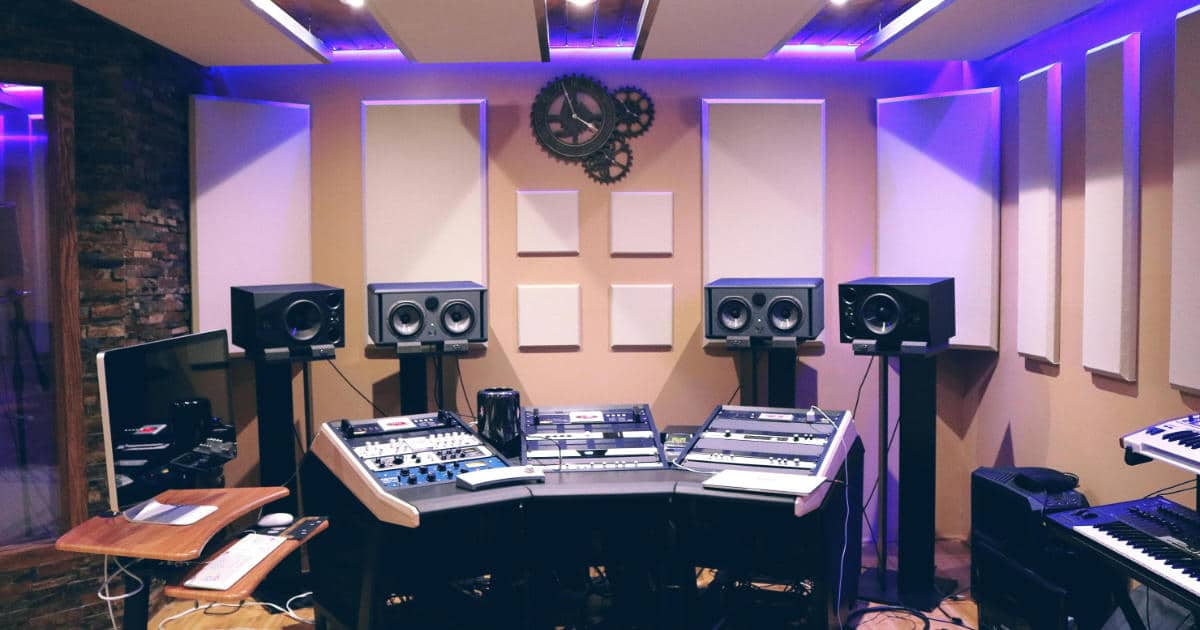Estimated reading time: 19 minutes
In the ever-evolving world of music production, finding the perfect Ableton controller can feel like searching for a needle in a haystack. Whether you’re a bedroom producer or a professional musician, the right controller can transform your creative workflow from mundane to magical.
But with dozens of options flooding the market – from compact MIDI keyboards to sophisticated control surfaces – how do you choose the one that truly elevates your music-making experience? Some producers waste hundreds of dollars on controllers that end up collecting dust because they don’t match their production style or technical needs.
Let’s cut through the noise and explore the 14 best Ableton controllers that stand out in 2025. From the revolutionary Ableton Push to the budget-friendly Arturia Keystep Pro, we’ll break down the essential features, pros, and cons of each controller to help you make an informed decision that aligns with your musical aspirations.
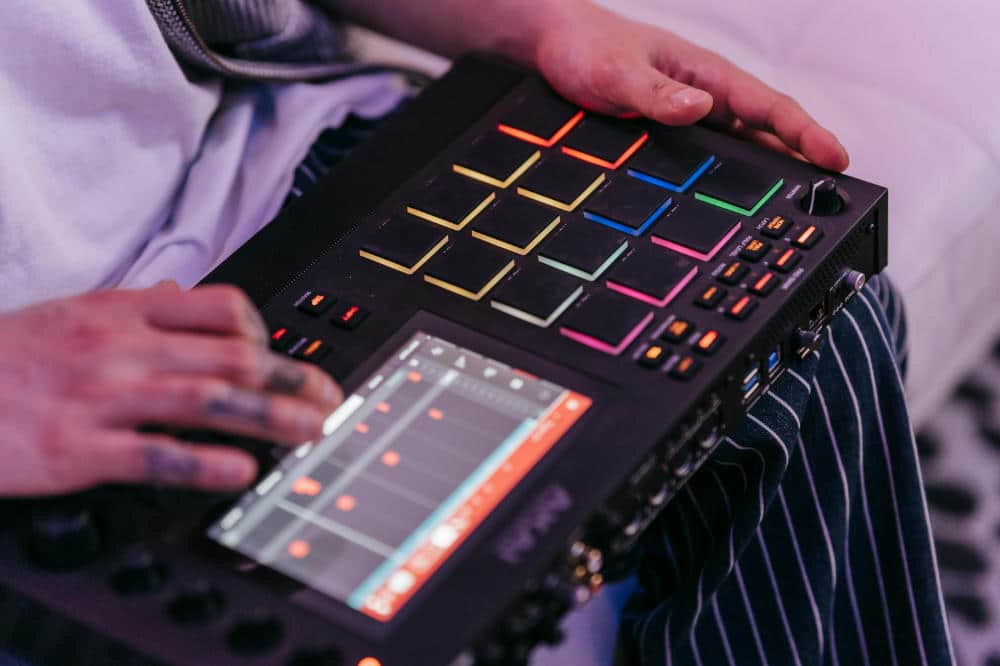
Ableton Push
Features
The Ableton Push stands as the flagship controller specifically designed for Ableton Live, offering an unparalleled integration that makes it the gold standard for music production. Here are its standout features:
- 64 velocity and pressure-sensitive pads
- RGB backlighting for visual feedback
- Step sequencing capabilities
- Real-time performance controls
- Touch-sensitive encoders
- 8 rotary encoders for precise parameter control
- High-resolution display feedback
- Context-sensitive parameter mapping
| Feature Category | Specifications |
|---|---|
| Display | High-resolution RGB screen |
| Pads | 64 RGB velocity-sensitive |
| Encoders | 8 touch-sensitive |
| Integration | Native Ableton Live support |
| Connectivity | USB-powered, MIDI I/O |
The Push excels in its tactile workflow, allowing producers to compose, arrange, and perform without touching their computer. The intelligent scale modes and chord recognition make melodic composition intuitive, while the step sequencer transforms beat-making into a hands-on experience. The device’s build quality is exceptional, featuring a metal chassis and premium components that ensure durability for both studio and live use.
The Push’s deep integration with Ableton Live’s browser enables quick access to instruments, effects, and samples, while the adaptive display provides real-time feedback of parameter changes and track information. Now, let’s examine how the Akai Professional Force offers an alternative approach to music production.
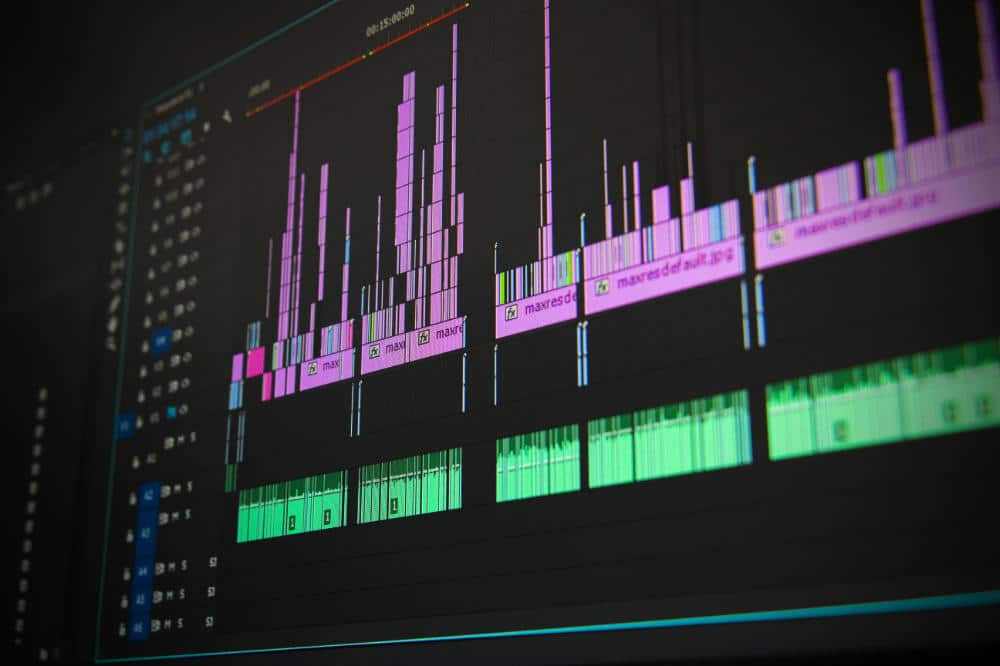
Akai Professional Force
Features:
The Akai Professional Force stands as a powerhouse among Ableton controllers, offering a comprehensive standalone production system that seamlessly integrates with Ableton Live. Here’s what makes it exceptional:
Key Features:
- 8×8 RGB clip-launch matrix
- 7-inch multi-touch display
- Full-size velocity-sensitive pads
- 8 touch-sensitive knobs
- 4 touch-sensitive sliders
Performance Capabilities:
| Feature | Description |
|---|---|
| Standalone Mode | Complete production without computer |
| Live Integration | Seamless Ableton Live control |
| Input/Output | 8 CV/Gate outputs, MIDI I/O |
| Storage | 16GB internal, expandable via SD/USB |
| Display | Full-color touchscreen interface |
The Force excels in these critical areas:
- Track Management
- 8 simultaneous tracks
- Real-time arrangement view
- Immediate clip launching
- Sound Design
- Built-in synthesizers
- MPC-style sampling
- Time stretching and warping
- Mixing Controls
- Dedicated mixing interface
- Parameter automation
- Effects processing
The Force’s robust build quality and intuitive workflow make it ideal for both studio production and live performance. Now that we’ve explored this powerhouse controller, let’s examine the innovative features of the Novation SL MkIII, which offers a different approach to Ableton control.
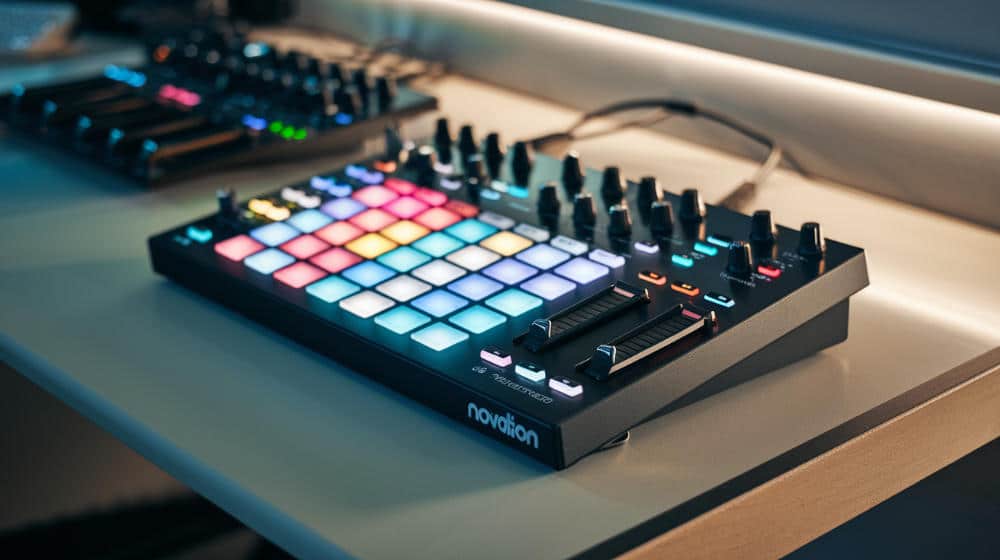
Novation SL MkIII
The Novation SL MkIII stands out as a premium MIDI controller that offers exceptional integration with Ableton Live. This sophisticated controller combines comprehensive DAW control with advanced sequencing capabilities, making it an excellent choice for both studio production and live performance.
Key Features
- 61-key semi-weighted keybed with aftertouch
- 8 RGB LCD screens for parameter feedback
- 16 velocity-sensitive pads
- 8 endless rotary encoders
- Built-in 8-track sequencer
- CV/Gate outputs for analog gear integration
Integration Capabilities
| Feature | Capability |
|---|---|
| Ableton Control | Deep integration with Session and Arrangement views |
| Auto-mapping | Instant parameter mapping for VSTs and devices |
| Screen Feedback | Real-time visual feedback for all parameters |
| Transport Control | Dedicated transport section with loop controls |
The SL MkIII excels in its hands-on approach to music production, featuring an intuitive layout that keeps essential controls within easy reach. Its high-resolution screens provide clear visual feedback, eliminating the need to constantly reference your computer screen. The built-in sequencer allows for hardware-style workflow, even when working within Ableton Live.
What sets this controller apart is its ability to function as a standalone sequencer for external gear while simultaneously controlling Ableton Live. This dual functionality makes it particularly valuable for hybrid setups combining software and hardware instruments.
The Akai Professional Force offers a different approach to music production, focusing more on standalone capabilities and sample-based workflow.
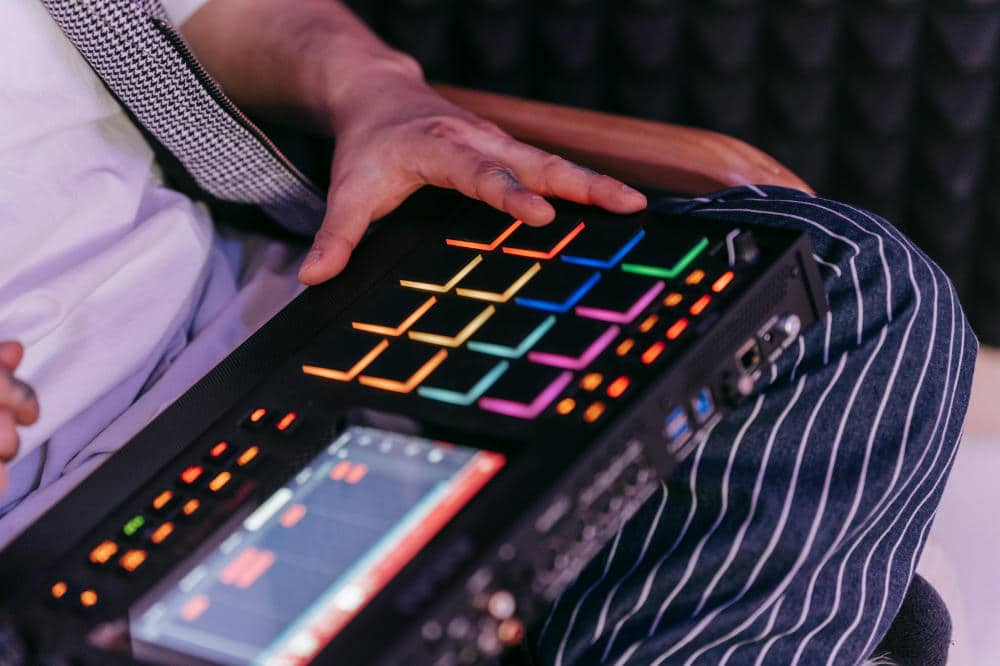
Features to Consider in an Ableton Controller
Essential Control Elements
- Transport controls (play, stop, record)
- Track faders and mixing controls
- Device parameter controls
- Clip launching capabilities
- DAW navigation buttons
Hardware Specifications
| Feature | Importance | Impact on Workflow |
|---|---|---|
| Pads | High | Beat making, clip triggering |
| Faders | High | Mixing, parameter control |
| Knobs | Medium | Sound design, effects |
| Keys | Medium | Melody input, chord play |
| Display | Medium | Visual feedback, parameter view |
Integration Capabilities
- Native Ableton integration
- Custom MIDI mapping options
- User templates
- Plug-and-play functionality
- Software editor support
Performance Features
- Velocity sensitivity for expressive playing
- Aftertouch for dynamic control
- Standalone operation capability
- Multiple MIDI routing options
- Scene launch functionality
Build Quality Considerations
- Robust construction materials
- Portable form factor
- Reliable buttons and knobs
- Quality of USB connection
- Power supply options
When selecting an Ableton controller, these features directly impact your music production workflow. The right combination of controls, build quality, and integration capabilities will determine how effectively you can interact with Ableton Live. Now let’s examine some specific controllers that excel in these areas, starting with the Yaeltex TURN.

Yaeltex TURN
The Yaeltex TURN stands out as a unique and highly customizable MIDI controller specifically designed for Ableton Live. This boutique controller offers unprecedented flexibility in its configuration, making it a powerful tool for music producers who demand precise control over their workflow.
Features
- Modular Design
- 16 fully customizable RGB encoders
- 32 RGB backlit buttons
- 4 touch-sensitive faders
- Expandable configuration options
- Custom Programming
- Built-in configuration software
- Multiple mapping layers
- User-defined color schemes
- MIDI feedback support
| Feature Category | Specifications |
|---|---|
| Controls | 16 encoders, 32 buttons, 4 faders |
| Connectivity | USB-MIDI, DIN-MIDI |
| Power Supply | USB-powered |
| Compatibility | Ableton Live 9+ |
The TURN’s standout characteristic is its advanced MIDI mapping capabilities, allowing producers to create complex control scenarios that adapt to different production stages. The robust aluminum construction ensures durability, while the RGB feedback system provides clear visual cues during performance.
The integration with Ableton Live is seamless, offering instant access to device parameters, mixer controls, and clip launching. The thoughtful ergonomic design places all controls within comfortable reach, minimizing hand movement during sessions.
With its robust build quality and advanced customization options, the TURN represents a significant step forward in MIDI controller design. Now, let’s explore another innovative controller in the market, the TouchAble Pro, which takes a different approach to Ableton Live control.
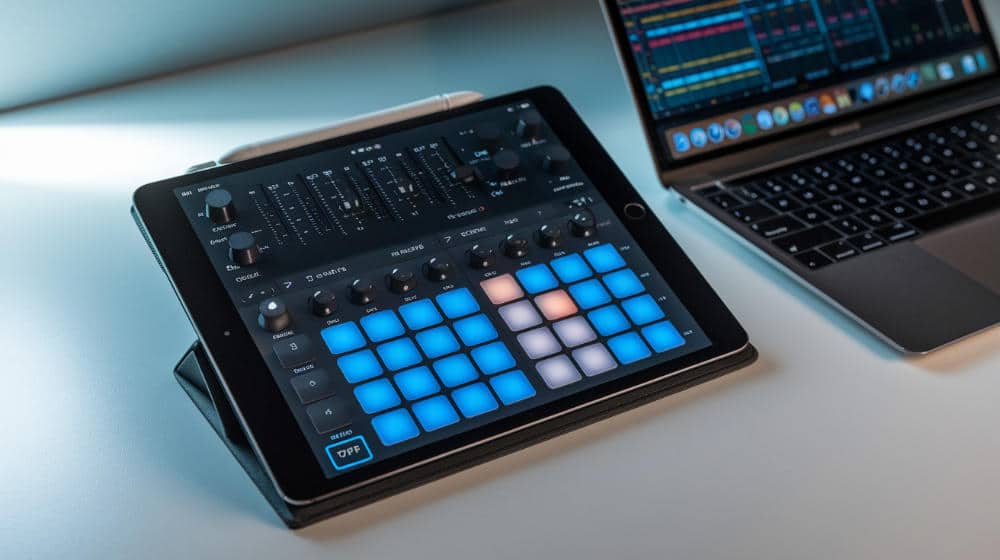
Zerodebug TouchAble Pro
TouchAble Pro stands out as a unique software-based Ableton Live controller that transforms your iPad or Android tablet into a powerful control surface. This virtual controller offers exceptional flexibility without the need for physical hardware.
Features
- Multi-Touch Interface
- Precise control over multiple parameters simultaneously
- Customizable layouts with unlimited pages
- Gesture-based controls for enhanced workflow
- Deep Ableton Integration
- Direct access to devices, clips, and mixer controls
- Real-time parameter visualization
- Full session view control
| Feature Category | Capabilities |
|---|---|
| Display | High-resolution graphics with color-coded elements |
| Connectivity | Wi-Fi and USB connection options |
| Customization | User-definable templates and controls |
| Device Control | Native support for all Ableton devices |
The TouchAble Pro excels in providing comprehensive control over Ableton Live’s features through its intuitive touch interface. Its modular design allows users to create personalized layouts that match their specific workflow needs. The controller offers exceptional value for producers seeking a portable solution without compromising on functionality.
What sets TouchAble Pro apart is its ability to adapt to different screen sizes and orientations, making it versatile for various devices. The controller’s response time rivals hardware alternatives, ensuring a seamless production experience.
With these powerful features in mind, let’s explore another innovative controller in our lineup – the Deadmau5’s OSC/Pilot, which takes a different approach to Ableton control.
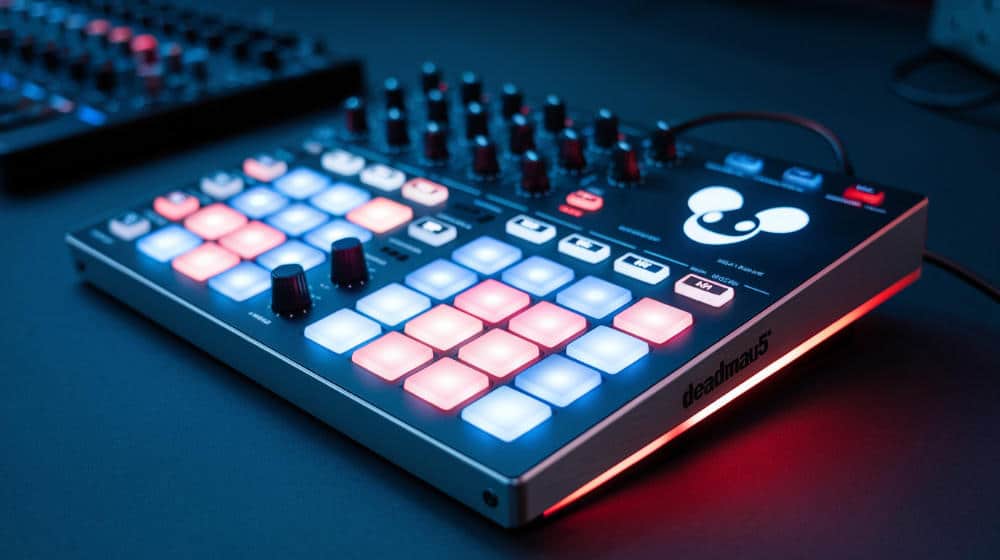
Deadmau5’s OSC/Pilot
Features
OSC/Pilot, developed by electronic music producer Deadmau5 (Joel Zimmerman), represents a unique approach to Ableton Live control. This open-source controller stands out in the following ways:
Key Capabilities
- Custom-designed interface with modular layouts
- Real-time parameter manipulation
- Comprehensive DAW integration
- Multi-touch support
- Customizable control surfaces
Technical Specifications
| Feature | Description |
|---|---|
| Protocol | OSC (Open Sound Control) |
| Interface | Web-based |
| Compatibility | Cross-platform |
| Connection | Network-based |
| Customization | Full JavaScript API |
The controller excels in providing precise control over Ableton Live’s parameters through its innovative OSC protocol implementation. Its modular design philosophy allows users to create personalized control surfaces that match their specific workflow needs. Unlike traditional hardware controllers, OSC/Pilot operates through a web interface, making it accessible from any device with a browser.
What sets OSC/Pilot apart is its deep integration capabilities and the ability to create complex control scenarios through its JavaScript API. This makes it particularly appealing for advanced users who require granular control over their production environment.
With electronic music production becoming increasingly sophisticated, the ability to design custom interfaces becomes paramount. Now, let’s explore another versatile option in the Sensel Morph, which offers a different approach to controlling Ableton Live.
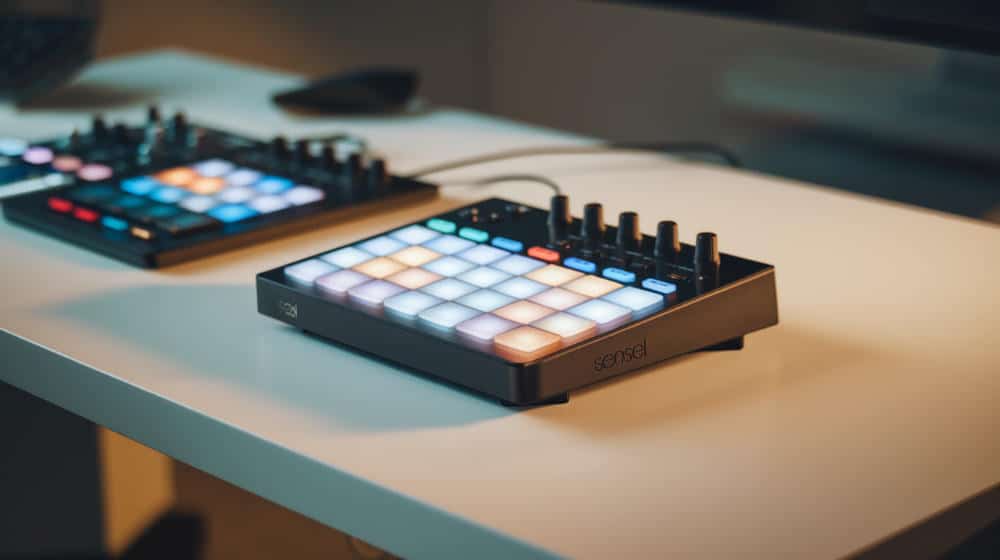
Sensel Morph
The Sensel Morph stands out as a revolutionary MIDI controller for Ableton Live, offering unprecedented versatility through its innovative pressure-sensitive surface and interchangeable overlays.
Features:
- Pressure Sensitivity
- 20,000 pressure sensors
- Tracks force from 2g to 5kg
- Sub-millimeter accuracy
- Multi-Touch Capabilities
- Supports up to 16 simultaneous touch points
- Gesture recognition
- Velocity-sensitive response
| Overlay Type | Primary Use Case | Compatibility |
|---|---|---|
| Music Production | DAW control, drum pads | Ableton Live |
| Piano | Traditional keyboard playing | Any DAW |
| Buchla Thunder | Experimental synthesis | MPE-compatible software |
| Gaming | Custom game controls | PC/Mac gaming |
The Morph’s distinctive advantage lies in its adaptability. Simply swapping overlays transforms it from a piano keyboard to drum pads, or even a mixing console. The pressure-sensitive surface provides expressive control perfect for sound design and dynamic performance.
With its compact form factor and robust build quality, the Morph serves as an ideal portable Ableton controller. The device’s USB-C connection ensures low latency and reliable performance, while Bluetooth capability adds wireless flexibility for mobile setups.
Now that we’ve explored this versatile controller, let’s examine the Novation Launchpad Pro Mk3, which offers a different approach to Ableton control through its grid-based interface.
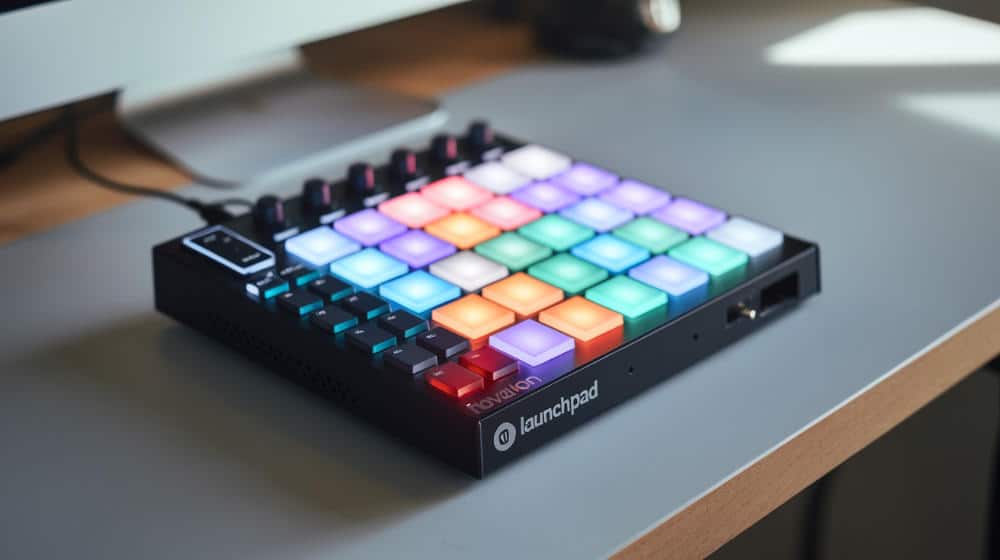
Novation Launchpad Pro Mk3
Features
The Novation Launchpad Pro Mk3 stands as a powerful and versatile Ableton Live controller, offering an impressive array of features that make it a top choice for music producers and performers.
Key Specifications:
- 64 velocity-sensitive RGB pads
- 8 Custom Modes
- Dedicated controls for launching clips and scenes
- Built-in sequencer with 32 steps
- USB-C connectivity
- MIDI In/Out/Thru ports
| Feature Category | Specifications |
|---|---|
| Pad Grid | 8×8 RGB backlit |
| Modes | Session, Note, Custom, Scale |
| Power Supply | USB bus-powered |
| Dimensions | 245 x 245 x 20mm |
| Weight | 1.3kg |
The Launchpad Pro Mk3 excels with its intuitive layout and deep integration with Ableton Live. The velocity-sensitive pads provide expressive control over drums and instruments, while the RGB backlighting offers clear visual feedback of clip states and playing notes.
What sets this controller apart is its standalone MIDI sequencing capabilities, allowing producers to create patterns without computer dependency. The chromatic layout makes it easier for melodic composition, and the scale modes help musicians stay in key while performing.
The device also features dedicated mixing controls and track arming buttons, streamlining the production workflow. With its robust build quality and comprehensive feature set, the Launchpad Pro Mk3 delivers professional-grade control at a competitive price point.
Now, let’s explore the innovative Yaeltex TURN, which offers a different approach to Ableton control with its unique customization options.
Novation Launchkey Mini MK3
The Novation Launchkey Mini MK3 stands out as a highly portable and versatile Ableton controller that offers exceptional value for both beginners and mobile producers.
Features:
- 25 mini-keys with velocity sensitivity
- 16 RGB backlit performance pads
- 8 rotary knobs for precise parameter control
- Dedicated arpeggiator controls
- Fixed Chord Mode for one-finger chord playing
- Bus-powered via USB
- Seamless Ableton Live integration
Performance Capabilities
| Feature | Benefit |
|---|---|
| Smart Chord Mode | Create complex harmonies instantly |
| Custom Modes | Personalize mapping for your workflow |
| MIDI Out | Connect to external hardware synths |
| Virtual Instrument Control | Direct access to Ableton instruments |
| Transport Controls | Essential playback and recording functions |
The Launchkey Mini MK3’s compact design doesn’t compromise on functionality. The RGB pads provide visual feedback for clip launching and drum programming, while the rotary knobs offer immediate control over device parameters in Ableton Live. The integrated arpeggiator and fixed chord mode expand creative possibilities without requiring deep technical knowledge.
What sets this controller apart is its perfect balance of portability and functionality. Despite its small footprint, it delivers professional-grade control features that seamlessly integrate with Ableton Live’s workflow. The inclusion of standalone MIDI capabilities means you can use it with hardware synthesizers and other DAWs.
Now that we’ve explored this compact powerhouse, let’s examine the PreSonus Atom SQ, which offers a different approach to Ableton control.
PreSonus Atom SQ
Features
The PreSonus Atom SQ stands out as a versatile Ableton Live controller that combines traditional pad control with modern production features. Here’s what makes it noteworthy:
Key Features
- 32 velocity-sensitive RGB pads with pressure sensitivity
- 8 rotary encoders for precise parameter control
- Touch strip for pitch and modulation
- Dedicated transport controls
- USB bus-powered with class-compliant MIDI
Performance Capabilities
| Function | Capability |
|---|---|
| Pad Modes | Step Sequencing, Drum Rack, Clip Launch |
| Integration | Native Ableton Live mapping |
| Display | OLED screen for parameter feedback |
| Custom Modes | User-programmable controls |
| Production Tools | Scale, Chord, and Arpeggiator modes |
The Atom SQ excels in both studio and live performance scenarios with its intuitive layout and responsive pads. The combination of step sequencing capabilities and hands-on mixing controls makes it particularly effective for beat-making and sound design in Ableton Live.
Its compact footprint doesn’t compromise functionality, offering deep integration with Ableton’s core features. The RGB pad feedback provides clear visual cues for clip status and parameter values, while the touch strip adds expressive control for performances.
Now that we’ve explored this powerful compact controller, let’s examine the Akai APC40 MkII, which offers a different approach to Ableton Live control with its classic design and expanded feature set.

Akai APC40 MkII
Key Features
The Akai APC40 MkII stands as a time-tested workhorse for Ableton Live control, offering an optimized layout that perfectly bridges the gap between software and hardware control.
| Feature | Description |
|---|---|
| Build Quality | Robust metal construction with rubberized knobs |
| Integration | Native Ableton Live mapping with plug-and-play functionality |
| Grid Layout | 8×5 RGB clip-launch matrix with color feedback |
| Faders | 9 touch-sensitive motorized faders (8 channel + 1 master) |
| Controls | 8 channel control knobs, device controls, and crossfader |
Essential Functions
- Dedicated transport controls for seamless playback and recording
- Scene launch buttons for quick arrangement navigation
- Track arming, solo, and mute controls
- Device control section for quick parameter adjustments
- Pan controls for precise stereo positioning
The APC40 MkII excels in live performance scenarios with its intuitive clip launching matrix and comprehensive mixing capabilities. The RGB pad feedback system provides clear visual cues about clip status, making it easier to navigate complex live sets. The device’s ergonomic layout places essential controls within easy reach, while the robust build quality ensures reliability during intense performances.
Unlike newer controllers that might overwhelm with features, the APC40 MkII focuses on core functionality that producers and performers need most. Its integration with Ableton Live is particularly seamless, requiring minimal setup time and offering immediate tactile control over your projects.
With these professional-grade features in mind, let’s explore the Alesis V49 MKII, which takes a different approach to Ableton control with its keyboard-centric design.
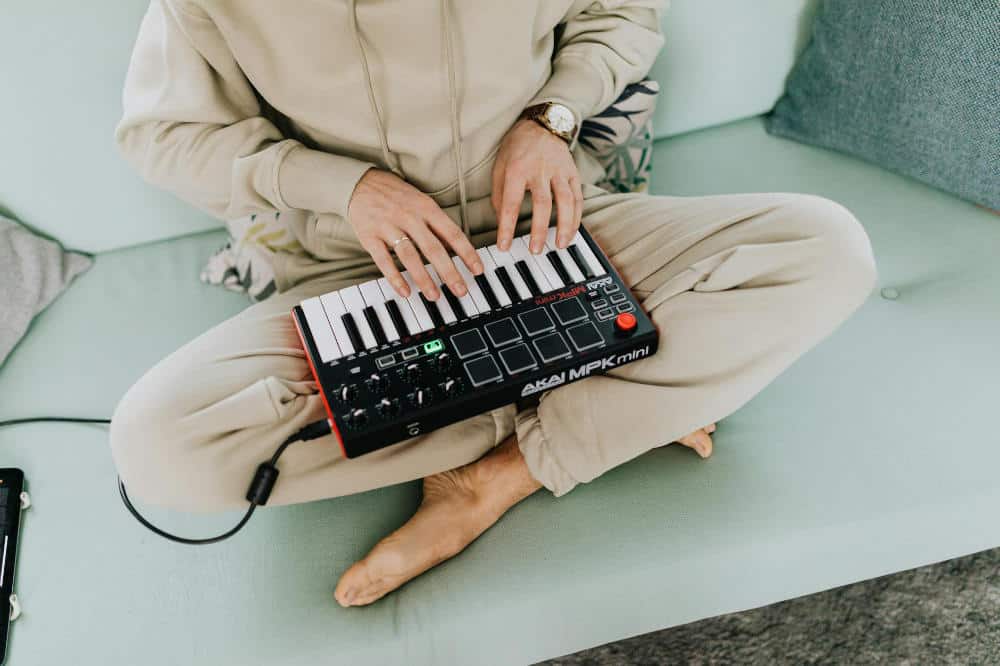
Alesis V49 MKII
Features
The Alesis V49 MKII stands out as an affordable yet powerful MIDI keyboard controller for Ableton Live, offering essential features for both beginners and intermediate producers.
Key Features:
- 49 full-sized, velocity-sensitive keys with natural piano feel
- 8 backlit RGB performance pads for finger drumming and clip launching
- 4 assignable knobs for real-time parameter control
- 4 programmable buttons for custom functions
- Pitch and modulation wheels for expressive performance
- Built-in arpeggiator with adjustable resolution and patterns
| Control Type | Quantity | Functionality |
|---|---|---|
| Keys | 49 | Velocity-sensitive, full-size |
| Pads | 8 | RGB backlit, velocity-sensitive |
| Knobs | 4 | Endless rotation, assignable |
| Buttons | 4 | Programmable, customizable |
The V49 MKII excels in providing essential MIDI control while maintaining a compact footprint. Its USB-powered design eliminates the need for external power, making it ideal for both studio and mobile setups. The keyboard’s premium feel belies its budget-friendly price point, featuring semi-weighted keys that provide satisfying resistance for expressive playing.
The integration with Ableton Live is seamless, with pre-mapped controls that work out of the box. The included software package features Ableton Live Lite, making it an excellent starting point for new producers entering the world of music production.
Now, let’s explore the Arturia Keystep Pro, which offers a different approach to MIDI sequencing and control.
Arturia Keystep Pro
The Arturia KeyStep Pro stands out as a sophisticated MIDI controller that brings professional-grade sequencing and control capabilities to Ableton Live.
Features:
- 4 Independent Polyphonic Sequencers
- 16 patterns per sequence
- Up to 64 steps per pattern
- Real-time recording and editing
- Advanced Control Layout
- 37 slim-key velocity-sensitive keyboard
- 16 touch-sensitive encoders
- Dedicated transport controls
- Connectivity Options
- USB MIDI
- 5-pin MIDI In/Out/Thru
- 8 CV/Gate outputs
- Clock sync I/O
| Mode | Function | Benefits |
|---|---|---|
| Seq | Step Sequencing | Precise pattern programming |
| Arp | Arpeggiator | Creative melody generation |
| Chord | Chord Memory | Quick chord progression creation |
| Keys | Direct Play | Traditional keyboard control |
The KeyStep Pro excels in its hybrid approach, combining traditional keyboard functionality with modern sequencing capabilities. Its robust build quality and metal chassis ensure durability for both studio and live performance settings. The LED indicators provide clear visual feedback of sequence progression and controller status, making it ideal for dark stage environments.
Now that we’ve explored the versatile KeyStep Pro, let’s examine how these various controllers compare in terms of their key features and functionality.
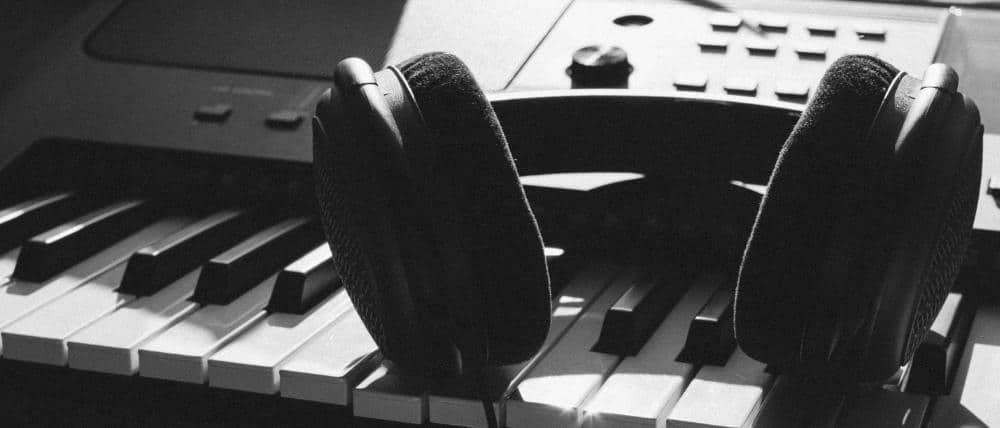
Choosing the right Ableton controller can significantly enhance your music production workflow and creative possibilities. From the comprehensive Push 2 to the versatile Novation Launchpad Pro, each controller offers unique features tailored to different production styles and preferences. Whether you’re a beginner looking for an entry-level device like the Launchkey Mini MK3 or a professional seeking advanced control with the Akai Force, there’s a controller that matches your needs.
Remember that the best controller is one that aligns with your specific workflow and musical goals. Consider factors like budget, portability, integration capabilities, and your primary use case before making a decision. Take time to explore the features of each controller and, if possible, test them hands-on to find your perfect match in music production journey.
Video: The BEST Ableton Live MIDI Controller?!
Conclusion
In conclusion, the ideal Ableton controller is the one that seamlessly aligns with your unique music production workflow, technical needs, and creative goals. Whether you prioritize portability, deep integration, or advanced customization, the diverse options available—from flagship devices like the Ableton Push to innovative solutions like TouchAble Pro—ensure there’s a controller for every producer. Take your time to evaluate your priorities and invest in a controller that inspires creativity and enhances your productivity. With the right tool in hand, your music-making journey will reach new heights.
Related Posts
FAQs
When selecting an Ableton controller, consider its compatibility with Ableton Live, control features (like pads, faders, and knobs), integration capabilities, and build quality. Controllers with native Ableton support offer a seamless workflow, while additional features like standalone mode or sequencing can enhance flexibility.
The Ableton Push is designed specifically for Ableton Live, offering deep integration and hands-on control. It includes 64 responsive pads, touch-sensitive encoders, and an intuitive display, enabling producers to compose and perform without needing a computer, which enhances creativity and workflow.
The Akai Professional Force features a standalone production mode, a multi-touch display, and an 8×8 clip-launch matrix, making it versatile for studio and live performance. Its seamless integration with Ableton Live and extensive connectivity make it a great option for hybrid setups.
The Novation SL MkIII combines a semi-weighted keybed with deep DAW integration and a built-in sequencer. It functions as both a MIDI controller and a standalone sequencer, allowing producers to control software and hardware instruments, which is ideal for hybrid workflows.
Yes, budget controllers like the Arturia Keystep Pro can still be effective with Ableton Live. They may lack advanced features, but they often include essential controls like MIDI pads, knobs, and basic transport options, making them suitable for entry-level or minimalistic setups.
